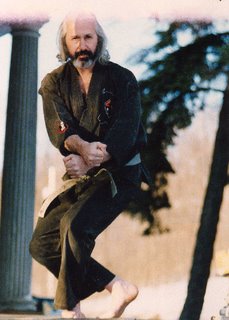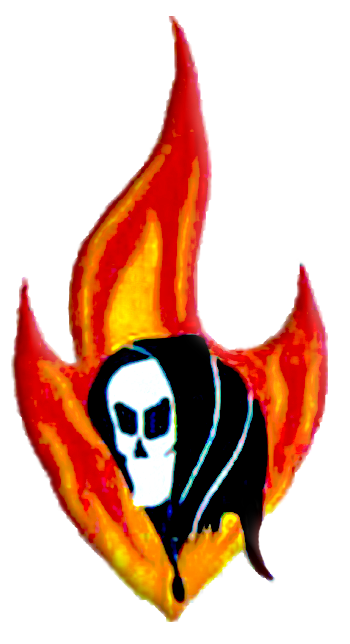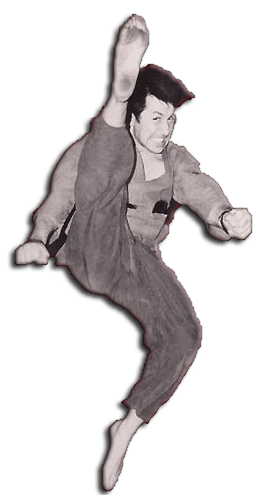About our school
-
 O'Sensei Richard Lenchus: The Legend
O'Sensei Richard Lenchus: The Legend
Grand Master Richard Lenchus (who everyone just calls "Sensei") came up the hard way. Truth is, what Sensei Lenchus learned on the street was almost as valuable as what he learned from his masters.
Sent from his home in Brooklyn to live with his mother and younger brother in Richmond, California, eleven-year-old Rick Lenchus got his first taste of the real world in 1949. "I was not considered White or Black," he recalls. "Every day, on the way to school, the White kids beat me up. On the way home, the Black kids got me." One day, the White gang hung him by his thumb with a make-shift meat hook. On his forehead, they wrote JEW with his own blood. "They did that so I wouldn't forget where I came from," said Lenchus. "I never forgot."
Young Lenchus was discovered in this predicament by a Hawaiian man named Pete. "He asked me, 'Didn't your father teach you how to fight?'" Lenchus recalls. "I told him I didn't have a father." So Pete began teaching him Kempo three times a week for the next few years until he returned to New York.
By the time he hit Coney Island, Lenchus was little more than a fight looking for a place to happen. He fought in the streets; and for the P.A.L. He competed in Golden Gloves bouts and was a gangbanger warlord in 1950s greaser gangs. His rap sheet was good and long before he ended up in the U.S. Marine Corps, and there the fighting continued. He fought on the USMC Boxing team; on the U.S.S. Breckenridge, The Sullivan, The Independence. He served in Japan (from Okinawa to Atsugi) from 1957-1961. It was there that he came under the tutelage of Sensei Kenjiro Kawanabe, a direct student of the legendary master Gichen Funakoshi. Kawanabe awarded Lenchus his shodan in 1960.
Upon returning to the states, Lenchus opened one of the earliest dojos on the east coast. Located at 142 Neptune Avenue in Brooklyn, he received such notables as Lou Angel, George Coefield, Steve Kaufman, Eddie Gross, Harvey Cohen, and Thomas LaPuppet.
Grand Master LaPuppet once told me, "I don't remember Mr. Lenchus doing katas, but oh could that boy fight!"
You better believe he could fight. Lenchus was part of the 1962 Blood and Guts era with Mas O'Yama at Madison Square Garden—with Peter Urban and Don Nagel. He sat with Sensei Nishiyama when Gary Alexander won the first U.S. championship. He was there at the Gladiators Arenas—at Sunnyside Gardens and those early bone breakers at the Beacon Theater and The New Yorker Hotel. He taught at Jerome MacKays with Senseis Slocum, Mori and Ansei, as well as at Judo Inc. where he trained champions like Malachi Lee.
Sensei Lenchus's credentials are like a heavy bag filled with gold coins. He's judged competitions all over the world. Along with being part of recognized associations such as the USA Karate Federation and the AAU, he's also co-founder of The International Grandmasters of the Round Table and The Grey Belt Society of Elders. He's done demos for the United Nations and played bodyguard to dignitaries from Moshe Dayan to Simon Weisenthal. He's even written several martial arts books as well as a weekly self-defense column. His Vermont home is bedecked with hundreds of trophies, plaques, medals, plates, cups, and certificates. He has more Hall of Fame acceptances than a shark has teeth.
Marking his 56th year in the arts, Lenchus spends his time these days providing seminars and delivering motivational speeches. He continues to dedicate his efforts to uniting the martial arts community along with his close colleagues Joe Onopa, Rico Guy, William Louie, Aaron Banks, Dr. Terrance Webster-Doyle, Carlos Varon, and Raymond Alamo. Of the many dojos that have sprung from his progeny of respected blackbelts, he is perhaps proudest of his heirs Master Alan Fisher, Master James Keller, and Grandmaster Bernard "Frenchy" Scarda, whose Legend Shotokan School in Staten Island is among the most feared on the east coast.
Lenchus has been addressed as Hanshi, Shidoshi, Soke, Kaicho, O'Sensei, Shihan, but he still prefers Sensei. That's what I've always called him. And when he calls me, I still stand up, even if we're on the phone and he's one thousand miles away. He can't see me on the other end of the phone, and it doesn't matter if he knows I'm standing or not, because I'm not doing it for him. I'm doing it for me. I'm standing for the man who taught me that Martial Arts is not just a game of tag but a way of life.
It has nothing to do with the way that guy looked in the parking lot after Sensei tore his jaw off.
(Clifford Meth, a Lenchus-Legend blackbelt, is the author of numerous books and is frequently syndicated by The L.A. Times Entertainment Newswire. He is currently working on Gene Roddenberry's Starpoint Academy for New Arc Entertainment).
(c) 2005 Clifford Meth. Reprinted with permission by ACTION MARTIAL ARTS MAGAZINE
read more
Testimonials
"Sensei Lenchus is a master who understands traditional karatedo. He embodies the discipline and love for his students in the untimate meaning of Budo. "--Sensei John P Mirrione
"Training with Rick Lenchus allows you to cut away all the nonsense and hyperboli and utter bulls**t associated with martial arts. It's hardcore, clean, reality-based combat training rooted in tradition and flavored by Sensei's own mad, inimitable style. "-- Clifford Meth
"There is only one Sensei Richard B. Lenchus! Although long ago, I was honored to have studied under him. I value his mentorship and his friendship. It is a honor, a privilege and a blessing knowing him. "--Richard A. Pileggi


